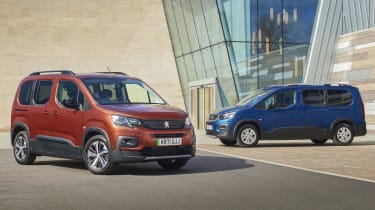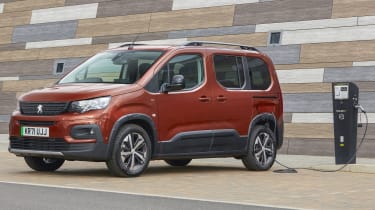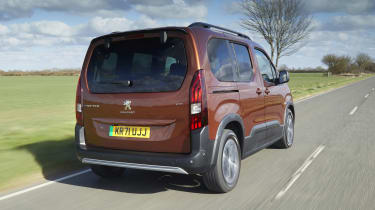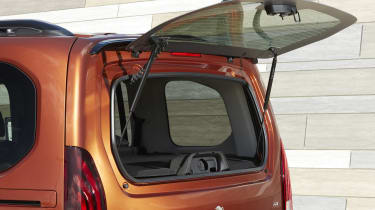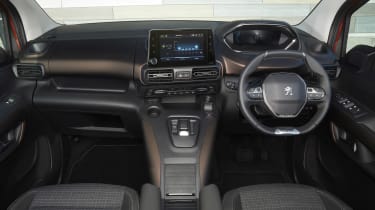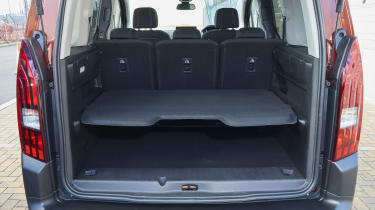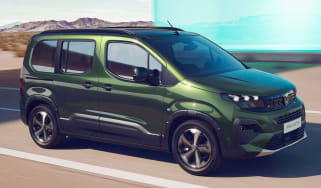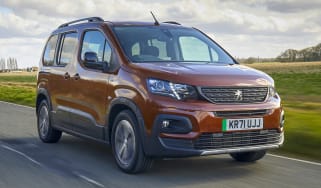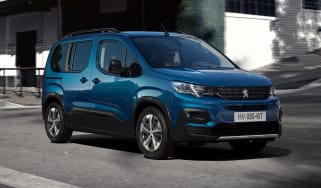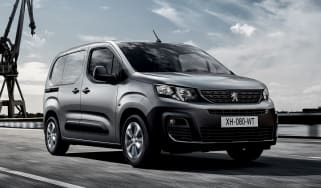Peugeot e-Rifter MPV review
"The Peugeot e-Rifter is an unpretentious family workhorse that takes everyday tasks in its stride"
Pros
- Low running costs
- Comfortable ride
- Colossal boot
Cons
- Wayward handling
- e-Berlingo cheaper
- Plasticky interior
In an age in which it seems a car isn’t allowed to be merely a car but must also exist as an extension of your lifestyle and personality, the Peugeot e-Rifter is a breath of fresh air. The e-Rifter, along with its sister models the Citroen e-Berlingo and Vauxhall Combo-e Life, make no apologies for their simple, utilitarian nature. They're based on small vans, designed to suit the needs of independent traders, delivery companies and other businesses.
 Top 10 best electric SUVs – the ones to buy in 2025
Top 10 best electric SUVs – the ones to buy in 2025
From early 2022, the all-electric e-Rifter became the only version available, after the petrol and diesel models were dropped from the Rifter range. In e-Rifter form, the model still has plenty to offer with a 171-mile range and fast-charging. This should make it ideal for anyone making shorter trips or who doesn't mind stopping at a public charger on longer jaunts.
For MPV buyers, practicality is a must, with durability, value and low running costs are also similarly important. These factors are appealing to families, too, and the e-Rifter – adds a welcome touch of style to that mix. There's more than a hint of SUV muscle to its stance, with grey cladding to its sills and wheelarch surrounds, as well as a metallic section to the lower front bumper in the style of a rock-guard.
In truth, it was always going to be a bit of a stretch to apply SUV style to what's essentially a van, but the e-Rifter is a handsome enough machine to be accepted in its own right. Its body surfaces are nicely sculpted, with feature contours above each wheel arch, and a side window treatment that could have been more forgettable than it actually is. Peugeot's latest design looks at home, too, and works very well with the e-Rifter's 'smiling' bumper intake and slatted lower grille.
Every version of the e-Rifter is front-wheel drive, but that SUV-esque styling isn't just for show – in fact, it could well prove one of this practical family car's greatest assets in taking on the rough-and-tumble of urban life. The grey plastic parts should shrug off dings from car doors and errant shopping trolleys and its impressive ground clearance means city potholes and kerbs shouldn't cause any scrapes. You'll now need to specify the more expensive long-wheelbase version if you want seven seats; the standard-length car is a strict five-seater.
With its commercial-vehicle origins, safety is a higher priority than active driver assistance – with tech such as adaptive cruise control available as part of the optional Driver Assist pack. While the e-Rifter hasn’t been crash tested by Euro NCAP, the regular petrol and diesel Rifter scored a four-star rating when it was tested in 2018. In terms of reliability, while the e-Rifter’s electric powertrain remains unproven, it’s shared with a number of other Peugeot and Vauxhall models, and features fewer moving parts than the engines so it should be dependable.
Range, charging & running costs
In early 2022, the petrol and diesel versions of the Rifter were discontinued leaving the electric e-Rifter as a standalone model. Now only available second-hand, the conventional versions of the Rifter won’t break the bank to run. The most efficient petrol engine is capable of around 45mpg, while the diesel is best suited to high-mileage drivers, returning up to 57mpg.
The Peugeot e-Rifter will be very cheap to run if you can regularly plug it in at home, although it's also more expensive to buy than the mechanically identical e-Berlingo and Combo-e Life. Thanks to a 50kWh battery, the standard e-Rifter has a range of up to 171 miles, while the long-wheelbase version sees this drop slightly to 166 miles. The on-board charger can fully top up the battery in 7.5 hours when connected to a home wallbox. The e-Rifter is also compatible with public fast charging at up to 100kW DC, with an 10-80% charge taking around 30 minutes. The e-Rifter qualifies for VED (road tax) exemption and the lowest Benefit-in-Kind rate for business users. City dwellers will be able to enter low-emissions zones without paying any charges too, which could result in big cost savings if these form part of a regular commute.
Other running costs are unlikely to be ruinous, either – Peugeot offers service packages that make it easy to keep track of your car's annual maintenance needs. Its van origins help here: tyres, brakes and other consumables need to be affordable to please small businesses, too – pricey parts erode profits, which is the last thing commercial operators want. Peugeot's UK warranty runs for three years or 60,000 miles and can be extended as long as that mileage limit isn't exceeded.
Insurance for the e-Rifter starts in group 19 out of 50, so the model shouldn’t cost much more to cover than the discontinued petrol and diesel models, which were placed in group 10 for the entry-level diesel, rising to 16 for the most powerful petrol in top-spec GT form.
Electric motor, drive & performance
You can probably get a reasonable idea of how the Peugeot e-Rifter drives simply by looking at it – it's clearly not going to respond in corners like a sports car. Maintain realistic expectations, though, and the e-Rifter is thoroughly enjoyable to drive. It may be a beast of burden designed with commercial drivers in mind, but it certainly isn't all work, no play.
With a body that leans noticeably in corners, there's little point in pushing the e-Rifter too hard on country lanes anyway. Refrain from mischief, though, and you'll find the steering to be rewardingly accurate and with a real sense of connection to the road; the overall roadholding is just as sound as any other model that shares the e-Rifter's chassis – the EMP2 platform that can be found under the Citroen C4 SpaceTourer and impressive Peugeot 508 hatchback.
During our test of the e-Rifter, we were impressed by its ability in the city where the light steering and small wheel make it feel agile and easy to manoeuvre. All around visibility is great thanks to the large windows, huge mirrors and an array of parking sensors. The ride is also fairly refined, with only larger potholes and bumps causing the car to get unsettled. It also handles competently enough for a tall MPV, with decent enough resistance to body lean in corners, but it’s not really suited to any kind of enthusiastic driving.
On the motorway, the light steering becomes a bit of a hindrance, feeling imprecise at speed. The blunt design of the e-Rifter also creates a large amount of wind noise at motorway speeds, and high speed depletes the car’s range fairly quickly too.
With 134bhp, the e-Rifter's 11.2-second 0-62mph time doesn't feel particularly rapid, but we found this motor feels far nippier than the old petrol or diesel engines in most situations, thanks to the instant response when you press the accelerator. In Eco mode the e-Rifter is limited to 80bhp, with the normal setting increasing power to 107bhp, while the power mode unleashes the full 134bhp. We found the less powerful of the three driving modes was the smoothest, although you won’t want to be in that mode when going up steep hills.
When still offered, only the most powerful of Rifter engines – the 128bhp BlueHDi 130 diesel or PureTech petrol of the same power – offered enough grunt to really expose its handling limits. If you do overcook things, the front end will run wide a little untidily, but all drama evaporates if you simply lift off the accelerator. Full power is best reserved for when it's really needed, such as when joining fast-moving motorway traffic or overtaking tractors on a country road.
Compared to the BlueHDi 130 diesel, the 109bhp PureTech petrol engine feels rather less happy under the weight of the Rifter, although the 128bhp version might be different. The latter comes with an eight-speed automatic gearbox in place of the six-speed manual offered on others.
Of the discontinued models we’ve driven, the diesel automatic impressed us the most, so it’s a bit of a shame it’s no longer available. Picking an auto avoids the rather vague gearshift of the manual cars, while the 128bhp diesel pulls more convincingly than the ponderous 99bhp version. The heavier engine also seems to improve the Rifter's ride quality – the diesel is less prone to bobbing up and down on uneven surfaces.
Interior & comfort
Considering its 'van-with-windows' origins, the e-Rifter is remarkably comfortable inside. Cruising at motorway speeds is surprisingly quiet, with a roar of wind all that reminds you of just how slab-sided and tall this car is. The ride is comfortable, too – both on motorways and on slower urban roads.
It's also plush enough inside to have you considering a career driving vans. Although the e-Rifter is better-equipped than its commercial stablemate, the dashboard and interior design are shared between the two and prove comfortable and easy to use. Taking pride of place in the dashboard is Peugeot's i-Cockpit digital instrument panel, and we reckon the e-Rifter's iteration is the most successful yet – particularly as it seems tailored to suit a high driving position and tall dashboard design, which gives you a clear view over the steering wheel.
It's also pleasing to see physical controls for the heating and air-conditioning, rather than having to navigate through infotainment sub-menus in order to control the interior climate. The only disappointment is a choice of interior plastics that are clearly designed with commercial use in mind – the shiny, hard materials seem durable, but you won't enjoy touching or looking at them. Still, they might be just the ticket for dealing with the abuse that active family life can bring.
Now the base-spec Active has been dropped, the range consists of Allure, Allure Premium and GT trim levels. Even the cheapest model gets air conditioning, rear parking sensors, fog lights and an eight-inch touchscreen with DAB radio and smartphone mirroring. Allure Premium adds electric and tinted rear windows, a reversing camera, alloy wheels and the ability to open the rear windscreen. Top-spec GT brings keyless entry and start, multi-zone air con and more flexible rear seats.
Practicality & boot space
The SUV-style garnish that adorns the e-Rifter's exterior isn't the most convincing, but Peugeot's bulky MPV does actually offer certain features that are beloved of 'Chelsea Tractor' drivers. The high driving position is one and the panoramic view of the road is another. This comes thanks to a big windscreen and narrow pillars, which make it easy to judge the e-Rifter's width on narrow roads. And, thanks to having a far shorter nose than most SUVs, the front end's easy to keep track of, too. Indeed, even the long-wheelbase version only becomes a challenge when reversing into an awkward space.
It's clear that the e-Rifter was designed with long periods behind the wheel in mind – there's no shortage of places for drinks bottles – in fact, the door pockets can handle several at any one time. There's also a huge box in the dashboard, which can be cooled in some models and has ample room for a laptop computer, while rear-seat passengers get an airline-style locker that drops down from the ceiling. In total, there's 180 litres of interior storage for odds and ends.
The standard-length e-Rifter has five seats in standard form, with seven seats now being reserved for the Long version - even though the latter's extra length has little bearing on passenger room. It has a colossal effect on load space, though – in five-seat mode, the standard e-Rifter has a 775-litre boot, but the long-wheelbase version extends this to a huge 1,050 litres. Drop the second row and a truly van-like 3,500 litres of load volume is unlocked, compared to a still-enormous 3,000 litres for the standard model.
Reliability & safety
Standard safety equipment is generous, with all cars getting several driver assistance packs. Autonomous emergency braking is included, alongside lane-keeping assist, traffic sign recognition and a system that spots when you’re not paying attention.
When the discontinued petrol and diesel Rifter was tested by Euro NCAP in 2018, it received a four-star rating. It also scored strongly in the adult occupant protection category scoring 91% overall. However, it missed out on a five-star result because its performance in the vulnerable road users category was held back by a tall bonnet and stiff windscreen pillars, while the autonomous emergency braking system is unable to detect cyclists. While the electric e-Rifter hasn’t been tested by Euro NCAP, it shares its origins with the conventional version so gets the same safety rating.
It's tricky to make a judgement on owner satisfaction. Too few owners have participated in our annual Driver Power survey for the Rifter to be scrutinised. However, as the e-Rifter is powered by a less complex electric powertrain that’s shared with several other Peugeot and Vauxhall models, it should be reliable. Peugeot's performance as a brand, though, was decent – it took 11th place out of 29 brands in the latest survey. Of the Peugeot owners who responded, 18.6% reported faults in the first year of ownership.

